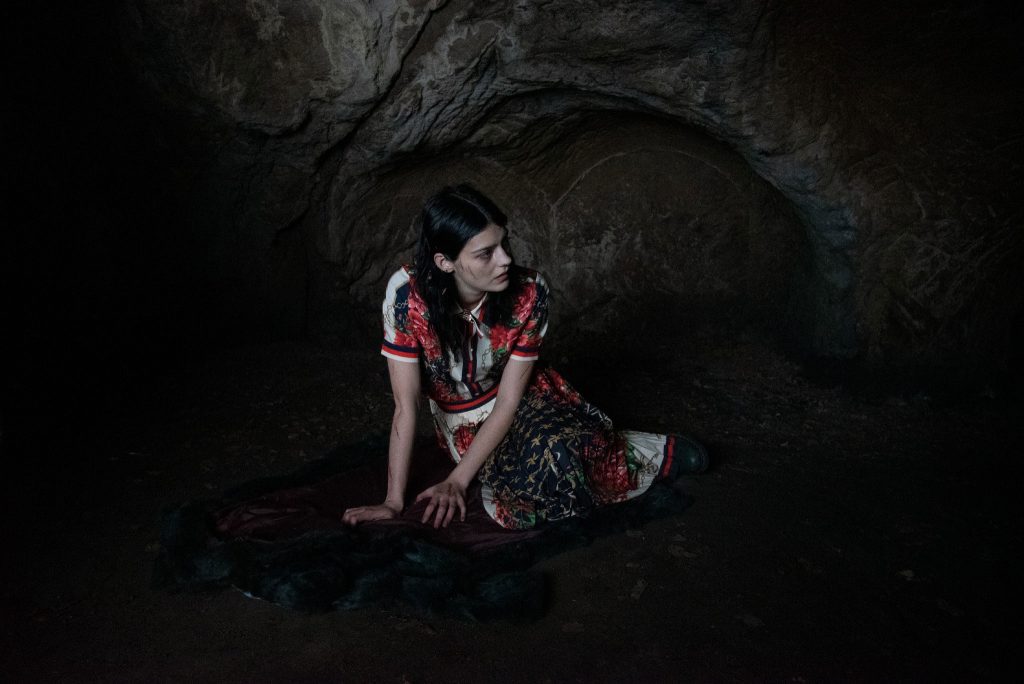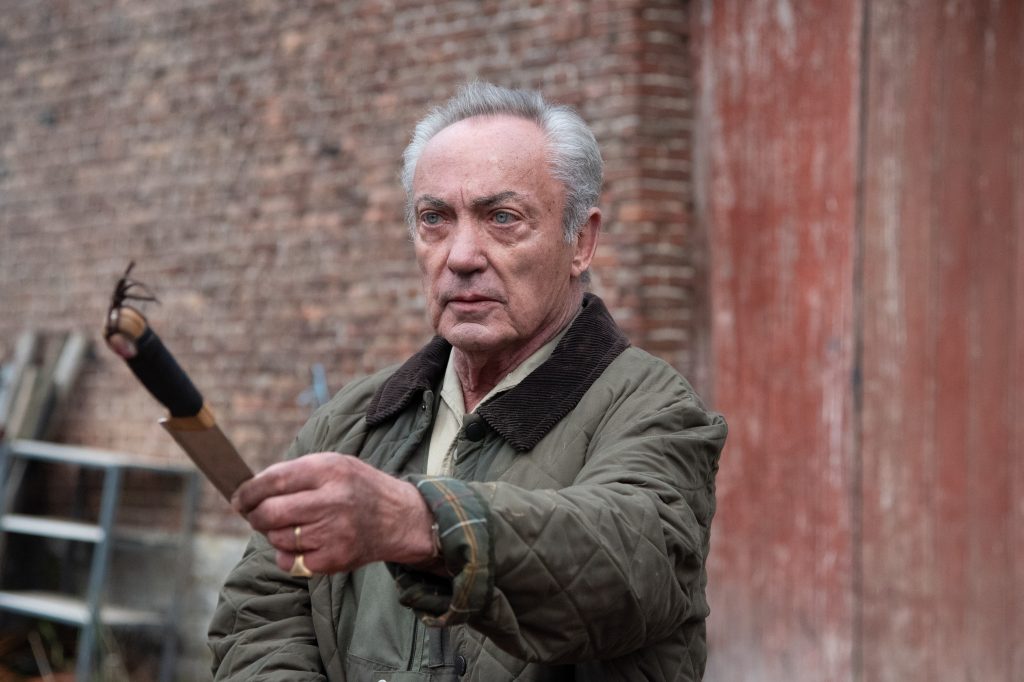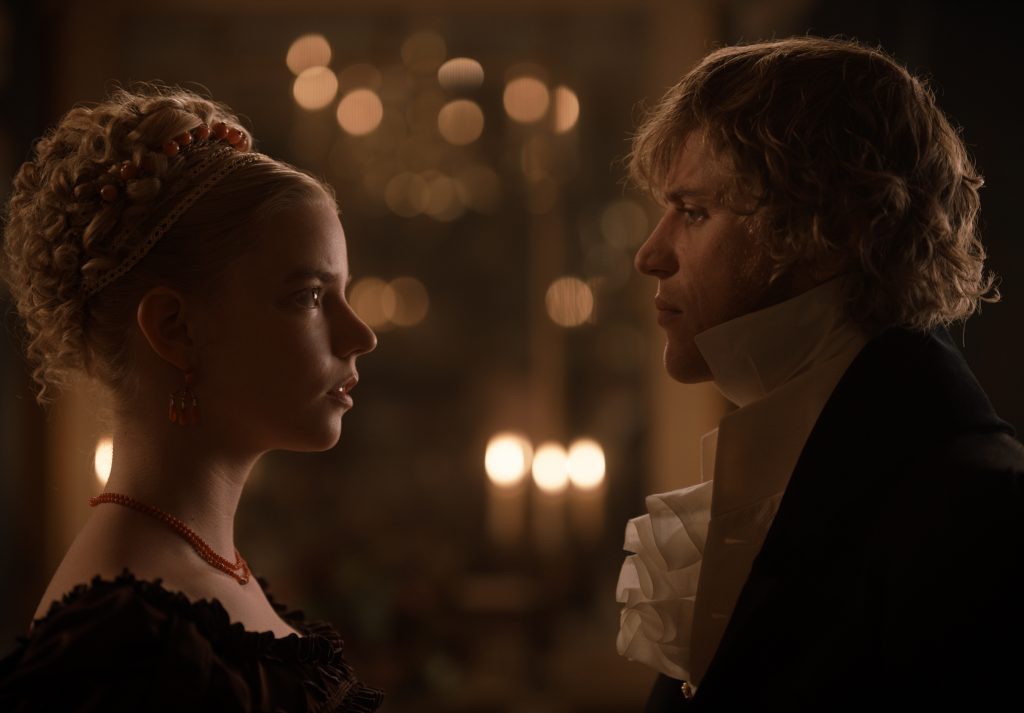August 10, 2020
by Carla Hay

Directed by Christian Neuman
Culture Representation: Taking place in Europe, the horror film “Skin Walker” features an all-white cast representing the wealthy and the middle-class.
Culture Clash: A woman goes back to her family home to confront dark secrets in her family’s past.
Culture Audience: “Skin Walker” will appeal primarily to people who like convoluted but stylish-looking horror films.

The horror film “Skin Walker” (written and directed by Christian Neuman) is best enjoyed if people know up front that it’s the type of movie where a scene that looks like reality could be a delusion of one of the characters. The truth is revealed at the end of the movie, but “Skin Walker” deliberately confuses and plays guessing games with viewers as part of the overall psychological horror that the film intends to convey.
The story, which takes place in an unnamed European country, is told from the perspective of Regine Kirk (played Amber Anderson), who’s in her late 20s and living in a big city. Regine is a semi-Goth-looking woman whose somber aura indicates that she’s not very happy with her life. The beginning of the movie shows her at a nightclub with other young people wearing a lot of black and dancing to industrial music. She spends the night with the guy that she was dancing with at the club, and he drops her off at home the next day. Is he her boyfriend or is he just a fling?
The next day, Regine goes to work in a factory, wearing the same drab uniform as her other co-workers. One day, when she goes home, the guy from the nightclub is there, which gives viewers the impression that he and Regine live together. His name is Jacob (played by Nicolas Godart), and he informs Regine that someone is there to visit her.
The unexpected visitor is a mysterious bearded man, who looks like he’s in his late 30s or early 40s His name is later revealed as Robert (played by Jefferson Hall), and he’s there to tell Regine some unsettling news: Her younger brother Isaac, who was believed to be dead, is really alive.
Regine emphatically tells Isaac that her brother is dead, while Robert tells Regine, “You look just like your mother.” Regine angrily asks Robert, “How do you know my mum? I’ve never seen you before in my life.” As proof that he knows Regine, he shows her a photo from the summer of 1998, when she was about 6 or 7 years old, that shows Regine, her mother and Robert together outside having a picnic on the grass.
Robert then drops another bombshell: He tells Regine that Isaac is his son. “He killed your grandmother,” Robert tells Regine. “They lied to you. He’ll start looking for you. You need to come home.” At this point, Regine is so upset that she wants Robert to leave, so Jacob throws Robert out of the apartment.
What Robert has told Regine has disturbed her so much that she decides to go back to her large family estate in the countryside to find out what really happened to Isaac, who was born when Regine was about 7 or 8 years old. Before she makes the trip, Regine visits her mother Rose (played by Sophie Mousel), who is living in a psychiatric institution, and tells her mother that she’s going home. Regine’s parents divorced years ago, when Rose left her husband for another man.
Regine goes home to the type of isolated mansion that is often seen in horror movies. It looks “normal” on the outside, but the inside is cold, dark and foreboding. Her father Claus (played by Udo Kier) is mourning the death of his mother (played by Marja-Leena Junker), who does not have a name in the movie. Robert has said that Regine’s grandmother was murdered by Isaac, but Claus denies it when Regine confronts him with this information.
It’s shown in the movie’s many flashbacks that Claus had a love/hate relationship with his domineering mother. Regine was an only child until Isaac was born. (Juliette Gillis plays Regine as a child in these flashbacks.) And there are lingering resentments over Rose’s infidelity, which essentially broke up the family.
Claus isn’t very happy to see his estranged daughter Regine, whose other reason for coming back home is to attend her grandmother’s funeral. Claus coldly tells Regine, “I’d never imagine that you’d set foot here again. I want you to leave after the funeral. You shouldn’t be here.”
Meanwhile, Robert is seen at a local bar getting drunk and babbling about his “lost son” Isaac and how he has to find him. Robert believes that Regine’s family secretly sent Isaac to live in an orphanage and that Isaac is now out to get revenge on the family. Robert is also seen showing up unannounced at the family home and asking Claus if anyone knows about their arrangement. Claus says no.
What exactly is this secret arrangement? And what was it about Isaac that caused the family to possibly reject him? It’s shown in flashbacks that Isaac was born with a severe deformity. When Robert sees Regine has come back to the area, they have another confrontation where she tells him, “Isaac died a few days after birth. I saw him. He was deformed and incapable of living.”
But is Isaac alive? And if he’s dead, what really happened to him? Those questions are answered by the end of the movie, which also has a strange character named Dr. Mantell (played by Luc Feit), who’s supposed to be Rose’s psychiatrist, but somehow he’s followed Regine to the countryside. Dr. Mantell begins stalking Regine, and he starts inflicting some terror on her.
“Skin Walker” is the feature-film debut of writer/director Neuman, who has a lot of talent in creating the right imagery for this Gothic-inspired horror film. There are many scenes that are very stylishly filmed by cinematographer Amandine Klee in ways that seem to be inspired by classic Dario Argento movies that have a rich color palette but dark overtones to never let viewers forget that they’ve stepped into an atmosphere of menace and treachery. And although many of the scenes take place outdoors or in the spacious mansion, the movie conveys a type of emotional claustrophobia that adds to the horror.
As Regine’s creepy father Claus, Kier is effective in his role, but he’s played these types of enigmatic and weird characters before, so there isn’t really too much of a surprise in his acting. The movie is really about Regine. Anderson gives a very chilling performance as a troubled woman whose inner turmoil unfolds like layers in the story, which takes viewers down a proverbial rabbit hole with her.
Because the movie plays tricks on viewers about what is real and what isn’t real in the story, “Skin Walker” might frustrate people who are expecting a more straightforward narrative in this horror film. It’s the type of movie that will grow on people if they think back to scenes where there were clues that something was off-kilter. Remembering the story in hindsight might compel people to watch the movie again to see how those clues were hiding in plain sight and how the confusing messiness of the narrative is actually just like a tangled web that makes more sense if you see how the points connect with each other.
Cleopatra Entertainment released “Skin Walker” on VOD on August 4, 2020.


